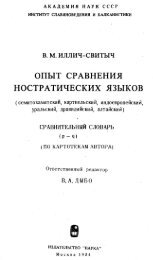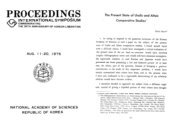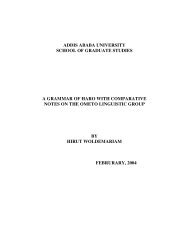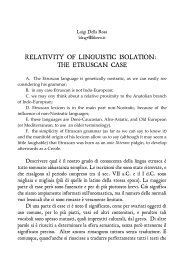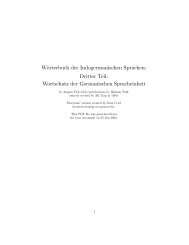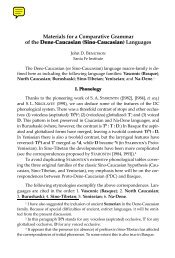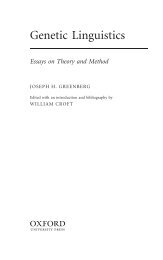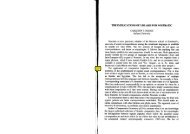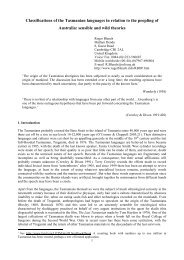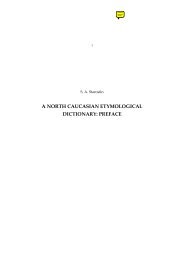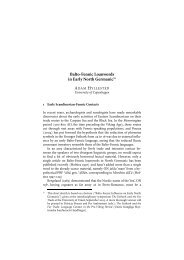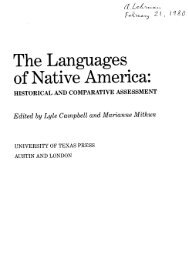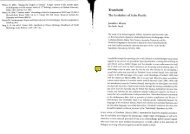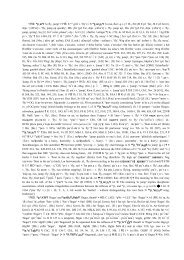The Indo-European Elements in Hurrian
The Indo-European Elements in Hurrian
The Indo-European Elements in Hurrian
You also want an ePaper? Increase the reach of your titles
YUMPU automatically turns print PDFs into web optimized ePapers that Google loves.
5. Pronouns, Numerals, Adpositions, Conjunctions, Adverbs 53<br />
It can also be noted that the Ergative case marker -š is dispensed with when suffixed by<br />
the enclitic Accusative pronouns:<br />
- iša-lla- ‘I (verb) them’ Mit. III 54<br />
- seni-wwu-tta ‘my brother (verb) me’ Mit. II 50<br />
- < d Ši-mi-i-gi-ni-e-ti-la-an> ‘the god Šimigi (may love) us’ Mit. I 77<br />
With these enclitic Accusative pronouns, the Ergative marker is made redundant. But it<br />
is kept when both the subject and the object are the 3rd person:<br />
- seni-wwu-šš-a-an ‘and my brother (verb) him’ Mit. III 1<br />
<strong>The</strong> enclitic pronouns can also be suffixed to the adverbs and conjunctions that appear at<br />
the beg<strong>in</strong>n<strong>in</strong>g of the sentence, or to numbers and, of course, to verbs:<br />
- <strong>in</strong>u-tta-n<strong>in</strong> ‘How me (my brother loves now)’ Mit. I 74<br />
- ai-lla-an ‘If them (...)’ Mit. II 75<br />
- tumni-lla ‘the four (ones)’<br />
- ‘I (will) br<strong>in</strong>g it’ KBo 32.15 Vo IV 15<br />
- < d A-al-la-ni-ma ta-a-ti-ya-aš-ši d IM-up-pa-ma : tap-ša-a-¯a mé-e-¯a> KBo 32.13 Ro<br />
28—29 ‘<strong>The</strong> goddess Allani, who loves him, toward Teššub as an échanson is stand<strong>in</strong>g’.<br />
Sometimes, the enclitic pronoun does not appear <strong>in</strong> the clause to which it belongs, as <strong>in</strong><br />
the follow<strong>in</strong>g paragraph <strong>in</strong> KBo 32. 15 Vo IV:<br />
- < 7. ti-wu-uš-¯i-ni ¯a-ši-im-ma m Me-e-ki-né-ella ><br />
- < 8. a-li-nu-um (:) “u-u¯-ni m Me-e-ki” i-ši-ik-ku-un-na ><br />
‘7. And Meki, hear<strong>in</strong>g the order, about them (?) [suffixed to Meki] 8. wh<strong>in</strong><strong>in</strong>g: ‘woe on<br />
Meki’, said he. <strong>The</strong> structure of the sentence is all the stranger as -lla is plural but tiwuš¯<strong>in</strong>i is<br />
s<strong>in</strong>gular, and both verbal forms al<strong>in</strong>u- and išikku- are <strong>in</strong>transitive. One hypothesis would be that<br />
the rationale for this component is to rhyme with the next l<strong>in</strong>e (?).<br />
<strong>The</strong> enclitic pronouns are sometimes pleonastically suffixed. This is attested <strong>in</strong> the<br />
<strong>Hurrian</strong>-Hittite bil<strong>in</strong>gual and <strong>in</strong> the Mitanni letter:<br />
- KBo 32.13 Ro I 25-26<br />
= Hitt. KBo 32.13 Ro II 26-27<br />
‘<strong>The</strong> ancient gods, she (the goddess Allani) placed them to the right to [not of] Teššub’<br />
Mit. I 76-77 (five <strong>in</strong>stances of tilla, tila ‘us’)<br />
- a-nam-mi-til-la-a-an d [Te]-e-eš-šu-pa-aš d Ša-uš-gaš d A-ma-a-nu-ú-ti-la-an<br />
- d Ši-mi-i-gi-ni-e-ti-la-an d E-a-a-šar-ri-ni-e-ti-la-an ma-an-šu-u-til-la-a-an<br />
It can also be noted that the Ergative case marker is dispensed with three times.



